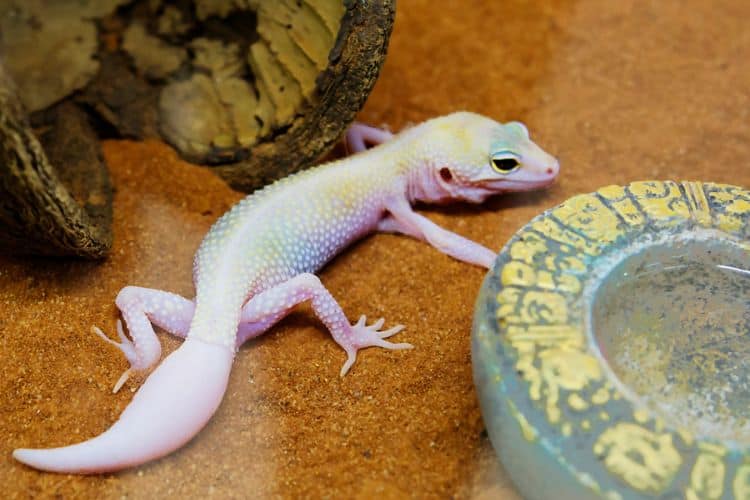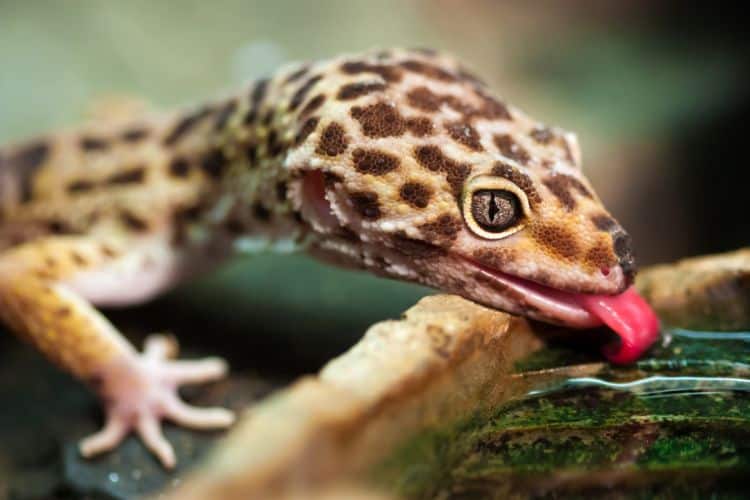Leopard geckos, with their curious eyes and captivating patterns, are popular reptile companions. But keeping them happy and healthy goes beyond just crickets and cozy hides.
One crucial aspect of their care is hydration. How much water does a leopard gecko need? How often should you change the water in my leopard gecko’s dish? And most importantly: can leopard geckos drink tap water safely?
In this article, I’ll discuss the safety and potential concerns surrounding tap water. I’ll also offer alternative solutions to guarantee your scaly friend stays happily hydrated.
Can Leopard Geckos Drink Tap Water? No – And Here’s Why
While tap water might seem like the most convenient option for your leopard gecko’s hydration, it’s important to understand the potential concerns lurking beneath the surface. Here’s why tap water can potentially be harmful for Leos:
Contains Hidden Chemicals
Tap water often contains disinfectants like chlorine and chloramines, which can irritate your gecko’s delicate digestive system and respiratory tract. Though small amounts might be tolerated, long-term exposure can be detrimental.
Depending on your location, tap water may also contain trace amounts of heavy metals, nitrates, or other contaminants.
Continued exposure to chemical contaminants and heavy metals in tap water can lead to the accumulation of toxins in the gecko’s body, potentially causing long-term health problems and reducing their lifespan.

Risk of Waterborne Illnesses
Tap water may harbor harmful bacteria and parasites that can make a leopard gecko sick. Reptiles are particularly susceptible to waterborne illnesses, so it’s crucial to provide them with clean, safe water to drink.
Disruption of Gut Flora
The chemicals and impurities in tap water can disrupt the delicate balance of bacteria in a leopard gecko’s digestive system, leading to digestive issues and other problems, like diarrhea, constipation, or bloating.
Is Tap Water Out of the Question?
While tap water may not be the ideal source of water for leopard geckos due to potential contaminants and chemicals, it can still be made suitable for them with proper treatment.
One common method to make tap water safe for reptiles is through the use of water filters.
A good quality water filter, such as a reverse osmosis (RO) filter or a carbon filter, can effectively remove harmful substances from tap water.
These filters can remove chlorine, chloramines, heavy metals, and other impurities, ensuring that the water is safe for your gecko to drink and bathe in.
Another option is to use tap water in conjunction with water conditioners specifically designed for reptiles. These conditioners neutralize harmful chemicals like chlorine and chloramines, making the water safe for reptiles to drink.
Additionally, allowing tap water to sit out for 24 hours before using it can help dissipate chlorine, although this method may not completely remove other contaminants present in the water.
What Kind of Water Should You Give Your Gecko?
Here are some considerations for providing the right kind of water for your gecko:
Filtered Water
Using filtered water, such as water treated with an RO filter or carbon filter, is often recommended.
These filters can effectively remove chlorine, chloramines, heavy metals, and other impurities commonly found in tap water, providing a cleaner and safer water source for your gecko.

Dechlorinated Tap Water
If filtered water is not available, tap water can still be used if it’s treated to remove chlorine and chloramines. Water conditioners specifically designed for reptiles can neutralize these chemicals, making tap water safe for your gecko to drink.
Purified Water
Purified water undergoes extensive filtration processes to remove impurities without stripping them of all nutrients. This makes it a safer option for leopard geckos as it retains essential minerals that contribute to their health.
Purified bottled water shouldn’t be confused with distilled water as distilled water lacks essential minerals that are important for the health of geckos. Distilled water as the sole source of hydration can lead to mineral deficiencies and other health issues in leopard geckos
Spring Water
Spring water is a natural source of hydration that can provide leopard geckos with essential minerals and trace elements necessary for their health. The mineral composition of spring water can vary depending on the geological conditions of the area where the water is sourced.
Best Practices for Hydration
Maintaining proper hydration is essential for the health and well-being of leopard geckos. Here are some best practices for ensuring your gecko stays hydrated:
- Always provide your gecko with clean, fresh water in a shallow dish. Replace the water daily to prevent bacterial growth and ensure freshness.
- Place the water dish in a location within the enclosure where your gecko can easily access it. Make sure that the dish is shallow enough for your gecko to drink from without difficulty.
- Keep an eye on your gecko’s hydration levels by observing their behavior and appearance. Signs of dehydration may include sunken eyes, wrinkled skin, lethargy, and decreased appetite.
- Leopard geckos absorb water through their skin, so regular misting of the enclosure can help increase humidity levels and provide additional hydration. Misting should be done lightly to avoid creating excessively damp conditions.
- Provide extra hydration for your gecko during shedding periods, as they may require more water to help facilitate the shedding process. You can increase the misting frequency or offer a shallow bath to assist with hydration.
Final Thoughts
Drinking tap water isn’t safe for leopard geckos because it often contains harmful chemicals like chlorine, chloramines, and heavy metals. These things could make your gecko sick if they drink it regularly.
As such, you should only use tap water if you have a good water filtration system specifically designed for reptiles.
Instead of worrying about chemicals in tap water and filtration, you can simply use spring water or purified water as safer alternatives. This removes the need for filtration and ensures that your gecko gets clean and safe hydration without any potential hazards.

